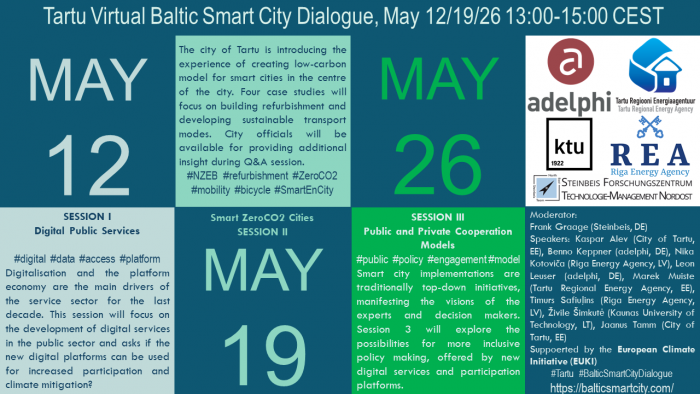
In the EU, municipalities are increasingly developing “smart” solutions for urban infrastructures and their integration. Frequently, the vision of a “smart city” is portrayed as key for sustainable, climate friendly municipalities. Building on a German smart city stakeholder dialogue, the project intends to foster European dialogue and learning on smart cities for climate mitigation. The focus will be on the infrastructure sectors mobility, energy and waste management and water and their integration. Besides this sectoral focus, the project will address several issue areas, among them (1) governance (smart city strategies, processes, structures and actors), (2) monitoring and evaluation and (3) transfer of best practices. The project comprises Estonia, Latvia, Lithuania and Germany, as well as forerunner and follower municipalities. Four dialogues will be organized, one in each country.
This project is part of the European Climate Initiative (EUKI) of the German Federal Ministry for the Environment, Nature Conservation and Nuclear Safety (BMU). It is the overarching goal of the EUKI to foster climate cooperation within the European Union (EU) in order to mitigate greenhouse gas emissions.
First Dialogue Platform - Webinar Series May 12th, 19th and 26th
Virtual Dialogue on Smart Cities for Climate Mitigation
- Event Timing: May 12th, 19th and 26th 2020; 2 pm - 4 pm, EEST /1 pm - 3 pm, CEST
- Organizers: Tartu Regional Energy Agency, Narva mnt 3, 51009 Tartu, Estonia
- Registration: LINK
The city of Tartu is at the forefront of the smart city development in Estonia. Growing from this experience, the virtual dialogue will focus on local cooperation models, presenting and comparing experiences from Estonia, Lithuania, Latvia and Germany, as well as on digital governance and smart climate neutral cities. Webinars are divided into three sessions: (1) Digital Public Services, (2) Smart ZeroCO2 Cities and (3) Public and Private Cooperation Models. During the sessions the experts from four countries will share their experiences and participants can present their best practices on local smart city initiatives. Participation is free but registration is required.
SESSION I: Digital Public Services
Tuesday, May 12th, Zoom teleconference
Digitalisation and the platform economy are the main drivers of the service sector for the last decade. This session will focus on the development of digital services in the public sector and asks if the new digital platforms can be used for increased participation and climate mitigation? What are expectations for digitalisation of the public domain and how accepted are they? What is the role of commercial platforms in providing public services and how are the citizens protected in the conflict of commercial interests? What are the concerns, risks and challenges of digitalisation of the public?
SESSION II: Smart ZeroCO2 Cities
Tuesday, May 19th, Zoom teleconference
The city of Tartu is introducing the experience of creating low-carbon model for smart cities in the centre of the city. Four case studies will focus on building refurbishment and developing sustainable transport modes. City officials will be available for providing additional insight during Q&A session.
SESSION III: Public and Private Cooperation Models
Tuesday, May 26th, Zoom teleconference
Smart city implementations are traditionally top-down initiatives, manifesting the visions of the experts and decision makers. Session 3 will explore the possibilities for more inclusive policy making, offered by new digital services and participation platforms. Cooperation with private sector and grassroot initiatives will be discussed in the context of ecological smart city services.
